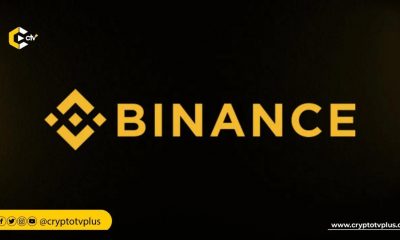FEATURED
Reasons why Binance should be banned in Nigeria

The Nigerian cryptocurrency industry has displayed persistent growth and heightened adoption. In the year 2022, Nigeria led the search for cryptocurrency-related information; out of 15 countries surveyed, Nigeria came first place for googling crypto-related information.
Also, a 2022 data revealed that approximately 22 million individuals, accounting for 10.34% of Nigeria’s total population, are estimated to own cryptocurrencies. As Nigeria progresses in crypto usage and adoption, the nation is a key market for one of the most notable global crypto exchanges, Binance.
Binance is a leading cryptocurrency exchange and has emerged as a major player in the global financial landscape since its inception in 2017 by Changpeng Zhao, popularly known as CZ.
Binance offers a diverse range of cryptocurrencies, facilitates trading, and has become a vital platform for users worldwide, including Nigeria.
Interaction with crypto exchanges like Binance in Nigeria among local crypto enthusiasts could pose several economic threats. Five possible threats include increased reliance on USD transactions, which could devalue the local currency.
Secondly, cyber threats and breaches may compromise the financial security of investors. Furthermore, Illicit activities, including money laundering and fraud, could escalate, affecting the country’s financial integrity.
Thirdly, increased adoption of cryptocurrencies and accessibility via platforms like Binance might reduce the government’s control over monetary policy, potentially destabilizing the economy. Moreover, the digital divide could worsen, and market speculation might lead to financial losses and reduced public trust.
While these threats may appear compelling, there are six other reasons why banning Binance in Nigeria might not be the optimal solution.
- Transaction Speed and Efficiency
In an era marked by technological advancements, the efficiency of financial transactions is important. Binance’s platform is characterized by its faster transaction times compared to traditional banks.
This speed is particularly significant for cross-border transactions, enabling businesses and individuals to transact seamlessly and without unnecessary delays.
By retaining access to Binance, Nigeria could strengthen its position in the global digital economy and enhance its attractiveness to foreign investors seeking efficient transaction methods.
- Cost-Effective Cross-Border Transactions
High transaction fees often plague traditional cross-border transactions, acting as a hindrance to international trade and remittances. Binance addresses this challenge by offering cost-effective cross-border transaction fees.
This affordability could have a transformative impact on Nigeria’s economy, encouraging greater participation in international trade and a more efficient receipt of remittances from the Nigerian diaspora.
By allowing Binance to operate, Nigeria stands to benefit from increased economic activity and improved financial inclusion.
- Access to Global Crypto Trading Markets
The modern financial landscape transcends borders, with digital assets allowing investors to access global markets with ease. Binance provides Nigerian traders and investors with an avenue to participate in the global market that runs 24/7, enabling them to diversify their portfolios and explore a wide range of investment opportunities.
Banning Binance could limit Nigerians’ access to these global markets, depriving them of the chance to benefit from the potential growth and innovation offered in the cryptocurrency sector.
- Crypto Tax Revenue Generation
As governments worldwide seek innovative revenue sources, cryptocurrencies offer a compelling avenue. Binance’s operations in Nigeria could contribute to the generation of crypto tax revenue, which could fund critical sectors such as infrastructure, education, and healthcare.
By establishing a regulatory framework that promotes responsible cryptocurrency use and tax compliance, Nigeria could harness the potential of cryptocurrencies to drive economic growth and development.
- Boosting the Naira and Economic Growth
The Nigerian economy faces various challenges, including currency devaluation and limited foreign exchange reserves. Binance’s presence in Nigeria could potentially address these issues by providing an additional source of foreign currency exchange and boosting the value of the naira.
Furthermore, fostering a supportive environment for cryptocurrency adoption and usage could attract foreign investments and stimulate economic growth. Rather than stifling innovation, the Nigerian government could leverage Binance’s platform to improve its economic resilience and long-term sustainability.
- Job Creation
Nigeria’s unemployment rate surged to 37.7 percent in 2022 and is projected by KPMG Nigeria to rise further to 40.6 percent in 2023. In this context, Binance’s presence in the country holds the potential to counteract this distressing trend.
In 2022, Binance partnered with BCAT Africa, an indigenous Blockchain Awareness and Education platform to launch a cryptocurrency awareness tour, an outcome that not only heightened awareness about cryptocurrencies but also imparted valuable skills to participants, effectively translating to creating jobs and transforming them into job creators.
Trading the crypto market for profit on platforms like Binance could enhance funding systems for small-scale businesses in Nigeria. This will allow businesses knowledgeably trade the crypto market and fund their business without looking for VCs and government aid.
Conclusion
While concerns about regulatory compliance and potential economic risks associated with Binance’s operations in Nigeria are valid, a complete ban might not be the most prudent course of action.
This thought was also amplified by Ernest Mbenkum, the CEO of Bantu Blockchain Foundation and Interstellar at the Stakeholder’s Policy Dialogue on the Implementation of the National Blockchain Policy organized by the NITDA in collaboration with SiBAN, where he argued against a blanket ban but for a balanced approach to regulating the blockchain industry in Nigeria.
The benefits of retaining Binance’s presence in the Nigerian crypto market are numerous and far-reaching. Striking a balance between regulatory oversight and fostering innovation could position Nigeria as a forward-thinking player in the evolving global digital economy.
Read also:
Glimpse of hope for users as Curve Finance plans to refund users
What do you think of this article? Share comments below.
























